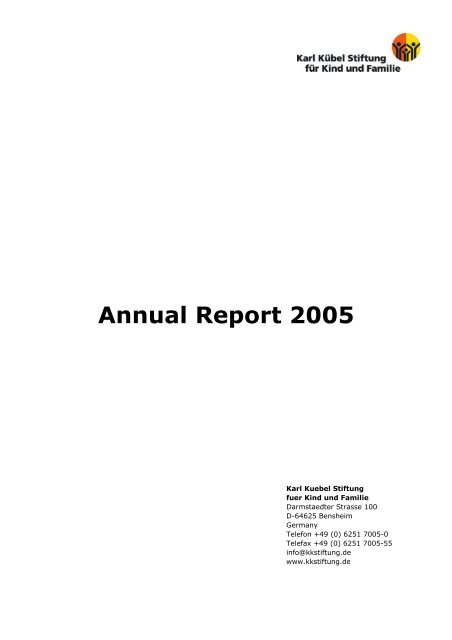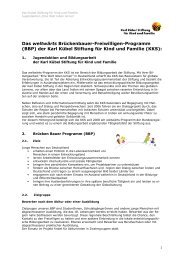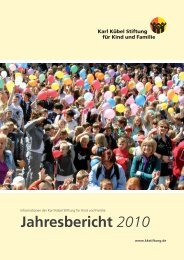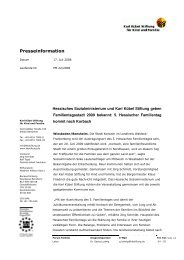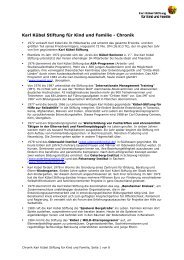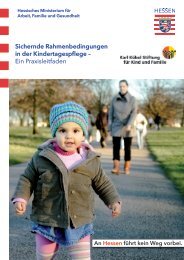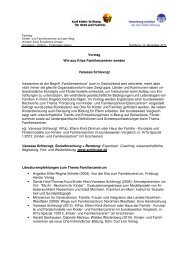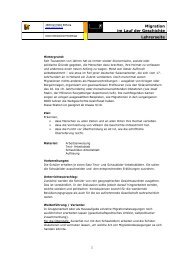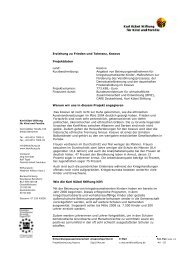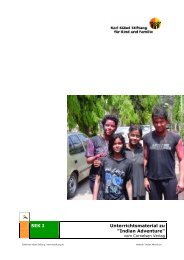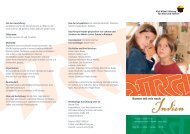Annual report-2005 - Karl Kübel Stiftung
Annual report-2005 - Karl Kübel Stiftung
Annual report-2005 - Karl Kübel Stiftung
Create successful ePaper yourself
Turn your PDF publications into a flip-book with our unique Google optimized e-Paper software.
<strong>Annual</strong> Report <strong>2005</strong><br />
<strong>Karl</strong> Kuebel <strong>Stiftung</strong><br />
fuer Kind und Familie<br />
Darmstaedter Strasse 100<br />
D-64625 Bensheim<br />
Germany<br />
Telefon +49 (0) 6251 7005-0<br />
Telefax +49 (0) 6251 7005-55<br />
info@kkstiftung.de<br />
www.kkstiftung.de
<strong>Karl</strong> Kuebel <strong>Stiftung</strong> fuer Kind und Familie, www.kkstiftung.de<br />
Table of contents<br />
<strong>Annual</strong> <strong>report</strong> <strong>2005</strong><br />
Page<br />
Preface 3<br />
Development Cooperation<br />
<strong>Karl</strong> Kuebel Institute for Development Education (KKID), India 5<br />
International Conferences 7<br />
Philippines 8<br />
Kosovo 9<br />
Youth Campaign 10<br />
Tsunami-Projects, India 11<br />
Family Forum<br />
School for Parents 15<br />
Child-friendly Services in the Internet 15<br />
3. Hessian Family Day 16<br />
hessenstiftung – familie hat zukunft 18<br />
Educational Institutes<br />
Odenwald-Institute 19<br />
Osterberg-Institute 21<br />
Felsenweg-Institute 22<br />
Networks and Cooperations 24<br />
Structure of the <strong>Karl</strong> Kuebel <strong>Stiftung</strong> (organigram) / The team 26<br />
<strong>Annual</strong> Report <strong>2005</strong> Page 2 /26
<strong>Karl</strong> Kuebel <strong>Stiftung</strong> fuer Kind und Familie, www.kkstiftung.de<br />
Dear Ladies and Gentlemen,<br />
Dear readers,<br />
Joerg Schmidt Gabriele U. Herrmann<br />
In <strong>2005</strong> the <strong>Karl</strong> Kuebel <strong>Stiftung</strong> stood with its non-profit-activities – International Development<br />
Cooperation, Family and Education Work – in a very intense dialogue with its social and political<br />
environment: Last but not least because “family” has been a big issue in the election campaign for<br />
the federal elections. Despite all differences, all democratic parties agree that families need<br />
stronger support, if economy and society are to have a bright future. With the 3. “Hessischer<br />
Familientag” (“Hessian Family Day”) and the 9. “Saechsischer Familientag” (“Saxon Family Day”)<br />
<strong>Karl</strong> Kuebel <strong>Stiftung</strong> made important contributions to enhance the commitment for families on all<br />
levels. We have accomplished sustainable changes and tangible improvements: The<br />
“hessenstiftung – familie hat zukunft” (“Hesse Foundation – Family is the Future”), which we<br />
administer since 2004, has indicated directions for important issues with projects such as “Studying<br />
with a child” and “Compatibility of family and job”. In addition to other activities our “Forum<br />
Familie” (“Family Forum”) with its parent course “Understanding the Baby” has pushed a<br />
preventive programme that can support especially young families with a problematic background.<br />
In view of the sustainability of our country, the educational system was the centre of debates<br />
about quality and equity of chances, early childhood promotion and occupational qualification. In<br />
this regard the three big Educational Institutes of the <strong>Karl</strong> Kuebel <strong>Stiftung</strong> have taken up a wide<br />
spectrum of these current issues – from the strengthening of occupational skills to the family<br />
education until the training of teachers. The numbers of participants demonstrate that the<br />
institutes are able to prevail on the competitive market of further education. Besides the positive<br />
economical development there have been a few milestones: The Osterberg-Institute celebrated its<br />
10 th anniversary, the Odenwald-Institute conducted a successful annual conference on “Education<br />
and Enthusiasm” in September and the Felsenweg-Institute has been assigned by the Free State of<br />
Saxony with the realisation of the 10. “Family Day”.<br />
In the year <strong>2005</strong> our division of Development Cooperation had its focus on the Tsunami-aid.<br />
Already at the end of 2004 the Hessian Federal Government as the initiator of the mission “Hessen<br />
hilft den Flutopfern” (“Hesse helps the Victims of Tsunami”) has authorised the <strong>Karl</strong> Kuebel <strong>Stiftung</strong><br />
with the implementation of all relief efforts. This meant to secure the targeted and speedy<br />
application of donations amounting to 1,4 Mio. Euro in support of families in need in the South<br />
Indian part of the disaster area. We have understood this task as a clear sign of confidence in our<br />
work – and we are aware of the big responsibility especially towards the people in need but also<br />
towards the donors and the project partners. Facing the extent of the damages and the big need<br />
for immediate and reconstruction aid there was no doubt in <strong>2005</strong> that we had to address those<br />
projects with especial intensive care over years. Parallel we have continued our commitment in<br />
India and the Philippines and have initiated further projects within the framework of “help for selfhelp”.<br />
In Kosovo we can also present specific achievements: since 2001 we work together with<br />
CARE International and the Federal Government. Programmes for children, teachers and parents<br />
are conducted to work on their trauma and to overcome tensions between the ethnic groups in the<br />
former regions of war.<br />
<strong>Annual</strong> Report <strong>2005</strong> Page 3 /26
<strong>Karl</strong> Kuebel <strong>Stiftung</strong> fuer Kind und Familie, www.kkstiftung.de<br />
Given the wide spectrum of our activities we will present a selection of project-highlights on the<br />
following pages. Complementary we would like to recommend you reading the additional annual<br />
<strong>report</strong>, which deals with the issue of development cooperation in-depth.<br />
It still applies that parents and children here and abroad need our assistance. To meet its duties<br />
and responsibilities the <strong>Karl</strong> Kuebel <strong>Stiftung</strong> is depending on your support – maybe this annual<br />
<strong>report</strong> gives you a reason for that. We would be pleased, if we could welcome you in the circle of<br />
like-minded people and sponsors, whom we would like to express our hearty gratitude at this<br />
occasion.<br />
The Executive Board<br />
Gabriele U. Hermann Joerg Schmidt<br />
<strong>Annual</strong> Report <strong>2005</strong> Page 4 /26
<strong>Karl</strong> Kuebel <strong>Stiftung</strong> fuer Kind und Familie, www.kkstiftung.de<br />
D E V E L O P M E N T C O O P E R A T I O N<br />
“Through the support of parents and families in different cultures we contribute to a<br />
comprehensive development of their children especially in the first three years.”<br />
“In development cooperation we stand up for the improvement of living conditions for the<br />
exceedingly needy sections of the society and contribute to more social justice. To strengthen the<br />
awareness of youths for their global responsibilities we support multipliers in their efforts for<br />
development education.”<br />
From the Foundation Guidelines of the <strong>Karl</strong> Kuebel <strong>Stiftung</strong><br />
Key Data of the Development Cooperation <strong>2005</strong><br />
18 new projects with a total volume of 4,18 Million Euro have been approved, thereof 1,83 Million<br />
worth of donations. With these new projects 20.400 families and 122.500 persons in 193<br />
communities have been reached. The total volume of all ongoing projects amounts up to 17,5<br />
Million Euro.<br />
<strong>Karl</strong> Kuebel Institute for Development Education (KKID), India<br />
www.kkid.org<br />
After more than five years of intensive work, the <strong>Karl</strong> Kuebel Institute for Development Education,<br />
close to the city of Coimbatore in the South-Indian State of Tamil Nadu, has been distinguished:<br />
both in its main sphere of competence in training of project staff as well as with its international<br />
conferences.<br />
The Institute at the foot of the Nilgiris Mountains<br />
With its modern learning infrastructure, the capacity to accommodate 100 guests, but especially<br />
due to its professional personnel the institute is in a good position on the market of providers for<br />
training and education. Moreover the reorganisation of the management and new operational<br />
sequences in the interchange between India and Germany provide more transparency: The<br />
institute has been tied closer to the section development cooperation, and the financial monitoring<br />
has been improved.<br />
The offering of training has shifted in the direction towards “customised” programmes in the sense<br />
of being specific for the need and demand of the training of staff of the customers. These have<br />
been especially requested in <strong>2005</strong>. On inquiry the premises are rented out as a conference hall.<br />
<strong>Annual</strong> Report <strong>2005</strong> Page 5 /26
<strong>Karl</strong> Kuebel <strong>Stiftung</strong> fuer Kind und Familie, www.kkstiftung.de<br />
The institute is financed through the contribution of participants, own service performances for<br />
projects and has been subsidised by the <strong>Karl</strong> Kuebel <strong>Stiftung</strong>.<br />
A selection of training and education offerings at KKID<br />
For the staff of Non-Governmental-Organisations (NGOs)<br />
-Establishment, development and strengthening of Self-Help- and Women-Groups<br />
-Participatory approaches for village development<br />
-Self-Help-Groups and management of micro-finance<br />
-Fabrication and exercise of herbal medicine for basis health services<br />
-Watershed-Development<br />
-Utilization of renewable energies for the village development<br />
For the Management of NGOs<br />
-Design, monitoring and evaluation of projects<br />
-Support of the sustainability of projects<br />
-Project management<br />
-Financial management of NGOs<br />
-Documentation and <strong>report</strong>ing<br />
-Writing of project proposals<br />
For personal development<br />
-Leadership and career management<br />
-Communication-, crisis- and conflict-training<br />
-Moderation and trainings methods<br />
-Co-operation in and with groups<br />
The headquarter of the <strong>Karl</strong> Kuebel <strong>Stiftung</strong> in Bensheim is closely cooperating with the institute,<br />
especially in the coordination of the international programmes:<br />
-Renewable energies and how they can contribute to the fight against poverty<br />
- This issue was the centre of attention of an international conference (see the <strong>report</strong> on the<br />
following page)<br />
-Since 2004 KKID is the supporting organisation of the triennial project “NGO-IDEAs” (NGO-<br />
Impact on Development, Empowerment and Actions). “NGO-IDEAs” is a cooperation of 32 Indian<br />
and 14 German NGOs working in the field of development cooperation. The expected synergy<br />
effects have been achieved, which is proven by the newly developed training course programme,<br />
e.g. for the issue of organisational development. To impart the newest skills and knowledge for the<br />
project executing organisation, workshops on the issue “Logframe” (instruments for the objectiveoriented<br />
project design) with moderators of the consulting-company EuronAid are regularly<br />
conducted.<br />
-The study trips for the promotion of intercultural dialogue and comprehension for the work of<br />
development projects have been restructured. Thematic modules have been offered together with<br />
travel businesses which in turn recruit participants.<br />
-The 66 page long brochure “Improved Protection for Indigenous People” including a CD, which<br />
recapitulates the results of a conference of the year 2004, has been released. The booklet with the<br />
focus on Asia is available at the <strong>Karl</strong> Kuebel <strong>Stiftung</strong>.<br />
KKID <strong>2005</strong> in numbers<br />
- 14.282 participating days - 5.230 participants of<br />
- 173 conducted events and conferences with - 104 organisations<br />
- 4 international events - thereof 78 NGOs<br />
- In total the KKID has been utilized by 55 organisations, among them 36 NGOs<br />
<strong>Annual</strong> Report <strong>2005</strong> Page 6 /26
<strong>Karl</strong> Kuebel <strong>Stiftung</strong> fuer Kind und Familie, www.kkstiftung.de<br />
International Conferences<br />
Example: Renewable Energies and Poverty Reduction<br />
From the 8 th until the 11 th March <strong>2005</strong> the international conference “Poverty Reduction through<br />
Renewable Energies” took place in the <strong>Karl</strong> Kuebel Institute for Development Education. For four<br />
days approximately 120 experts of private and governmental aid organisations discussed the<br />
possibilities to reduce poverty in developing countries through the application of renewable<br />
energies. Locally the event has been organised by KKID and the well-known Indian organisation<br />
“Action for Food Production” (AFPRO) from Delhi. The conference has been supported by the<br />
German Federal Ministry of Economic Cooperation and Development (BMZ) and the German<br />
Technical Cooperation (GTZ).<br />
More than 1.000 interested participants visited the special exhibition on the issue of renewable<br />
energies on the compound of the Institute. In this context for example solar lanterns or biogas<br />
plants have been presented. The experts agreed very soon: the distribution of renewable energies<br />
especially in the rural areas of India is indispensable.<br />
Visitors of the product exhibition<br />
“Renewable Energies“<br />
Numerous initiatives that are successfully<br />
applying resource-saving technologies have<br />
been introduced in the course of the<br />
conference. The private aid organisation<br />
“Barefoot College” in the Indian Union State of<br />
Rajasthan for example provided more than 100<br />
communities with electricity from solar cells.<br />
Two women have been trained as “solar<br />
engineers” in each of the communities. For a<br />
fee they maintain the solar plants and are in<br />
the position to conduct minor repairs. Another example shows how a decentralised biomass plant<br />
could successfully be built up in a huge delta area in the eastern part of India. Three years before<br />
local small farmers had started to cultivate fast growing plant species as biomass fuel. Now twelve<br />
villages are provided with electricity from the gasification and combustion of the biomass.<br />
However, as promising those examples are, the experts agree that it has not come to an area-wide<br />
distribution of decentralised renewable energies in India yet. The high investment costs as well as<br />
the insecure financing were named as the reasons. On the basis of further models it has been<br />
pointed out that those problems have been overcome where renewable energies were directly<br />
linked to income generating schemes. For instance this has been the case in Uttaranchal in<br />
Northern India where women Self-Help-Groups were working with solar spinning wheels. With the<br />
earnings it has been possible to cover the maintenance costs of the solar plants.<br />
The conference of several days’ duration ended with the positive conclusion that renewable<br />
energies can contribute substantially towards the reduction of poverty. A plan of action on how to<br />
tackle concrete activities to promote renewable energies in the rural parts of India has been<br />
adopted.<br />
The documentation of the conference and the plan of action are available in English as a brochure<br />
under the title “Combating Rural Poverty with Renewable Energy” including one CD at the <strong>Karl</strong><br />
Kuebel <strong>Stiftung</strong>.<br />
<strong>Annual</strong> Report <strong>2005</strong> Page 7 /26
<strong>Karl</strong> Kuebel <strong>Stiftung</strong> fuer Kind und Familie, www.kkstiftung.de<br />
Philippines<br />
International Conference against Sexual Exploitation of Children and Trafficking of<br />
Women in the Philippines<br />
In February <strong>2005</strong> 120 representatives of Philippine Non-Governmental-Organisations and the<br />
Government, as well as politicians and international participants came together in Cebu City to<br />
discuss a problem of extensive magnitude – the commercial sexual exploitation of children and the<br />
trafficking of women.<br />
During the two-day conference the reasons of the<br />
phenomena of the sexual exploitation of children and the<br />
trafficking of women have been analysed. The focus has<br />
especially been on the exchange of information,<br />
experiences and strategies to combat the problem. Plans<br />
of Actions that will be implemented by the partner<br />
organisations in the following five years have been<br />
developed in workshops. The conference ended with the<br />
preparation of a declaration which has been ratified by all<br />
participants.<br />
Children-Prostitution<br />
Estimates assume that 100.000<br />
children and young women are forced<br />
into prostitution in the Philippines.<br />
The metropolis Cebu City is one of<br />
the five most frequently visited<br />
centres for sex-tourism. Since a visa<br />
for the close-by China is not going to<br />
be obligatory from 2006 onwards<br />
anymore, experts fear that many<br />
brothel-visitors will come over to<br />
Cebu City.<br />
The conference was organised by the Philippine partner<br />
organisation JPIC (Justice, Peace and Integrity of Creation<br />
– Integrated Development Centre) in cooperation with four local organisations and with financial<br />
support from <strong>Karl</strong> Kuebel <strong>Stiftung</strong> as well as the European Union.<br />
In the forefront of the conference a two-day exposure programme has been organised for 20<br />
participants from Australia, Sweden, Korea and Germany. This gave the international visitors the<br />
chance to get to know the problem locally and to talk to the affected children and women. Thereby<br />
it became obvious for the participants how strong the problem is affected by the interlinkage of<br />
commercial and political interests.<br />
Participants of the exposure<br />
programme in the<br />
rehabilitation centre for<br />
former child prostitutes in<br />
Cebu City.<br />
“It is not possible to grasp with mind what we have seen there. Only through the encounter of the<br />
children and people on the spot one is able to realise the entire dimension. I am convinced that we are<br />
all responsible and I am planning to integrate it in my political work. For this the concrete “on-the-spotexperience”<br />
and the density with which we gathered information is helping me.”<br />
The EU-delegate Michael Gahler, deputy chairman of the development cooperation commission of the<br />
European Parliament, participant of the programme.<br />
<strong>Annual</strong> Report <strong>2005</strong> Page 8 /26
<strong>Karl</strong> Kuebel <strong>Stiftung</strong> fuer Kind und Familie, www.kkstiftung.de<br />
Kosovo<br />
Education for Peace and Tolerance – Project Evaluation Presents Evidence for the<br />
successful Project Approach<br />
Even five years after the war many people are still suffering from the consequences of destruction,<br />
terror and displacement. Especially children are heavily traumatised from experiences such as<br />
abuse, diversion and homicide of family members. Left alone with their fears and their memories,<br />
long-lasting mental problems are likely to emerge. The misuse of alcohol and drugs, aggression<br />
and a high disposition for violence are only some of the possible consequences.<br />
In the long run those consequences are in the position to obstruct the process of reconciliation<br />
within the Kosovar society. Therefore the mental recovery of war-traumatised children and their<br />
education for tolerance and non-violent conflict resolution is a crucial precondition for the peaceful<br />
co-existence of the Kosovar people in the 21. century.<br />
The programme “Help for Traumatised Children” started on the 1. May, 2000 with a pilot project. It<br />
is a common project of the <strong>Karl</strong> Kuebel <strong>Stiftung</strong> and the aid organisation CARE. The project is<br />
furthermore supported by the German Federal Ministry of Economic Cooperation and Development<br />
(BMZ). The project embraced 3.000 pupils of five primary schools in the region of Prizren. Initially<br />
it focused on the training of 132 primary school teachers. Until March 2001 they learned how to<br />
detect post-traumatic stress-syndromes behind ostentious behaviour like depressions,<br />
aggressiveness or emotional indifference of their pupils. Subsequently the experiences were<br />
worked up in a therapeutic-playful way so that the process of recovery and reintegration has been<br />
supported. Extensive counselling meetings with the parents also took place. Furthermore the<br />
project partner provided games and teaching material.<br />
In the second phase of the project (June 2002<br />
- end of May 2003) the focus shifted towards<br />
recreational-pedagogic and creative activities<br />
and towards a reintegration into a “normal”<br />
everyday live of children. 1.200 children were<br />
playing, drawing, singing and regularly taking<br />
part in the after-school activities. A local<br />
partner organisation of CARE was offering art-<br />
and theatre-projects for approximately 700<br />
children during the summer holidays. The<br />
follow-up project is running since November<br />
2003 until May 2006 also supported by the<br />
BMZ. This project focuses on the education for<br />
peace and tolerance and has been extended to<br />
16 new ethnically mixed school areas. Taken<br />
together all projects until the end of <strong>2005</strong><br />
nearly 11.000 pupils and more then 600<br />
teachers from 25 school areas in the region of Prizren have been reached.<br />
In nearly all project-provinces the objectives have been met or even exceeded. This concluded the<br />
well-known and independent consultant Margaret Stansberry in September <strong>2005</strong>. It is especially<br />
pointed out that the efficiency and the positive outcomes of the project resulted in an exceedingly<br />
high acceptance and reputation from behalf of children, teachers, parents and the local supervisory<br />
school authorities. Psychosocial and after-school programmes produced a change in behaviour of<br />
the majority of children and teachers. Therefore the <strong>Karl</strong> Kuebel <strong>Stiftung</strong> plans to extend the<br />
project from the middle of 2006 onwards in 12 more villages in the southern part of Kosovo.<br />
<strong>Annual</strong> Report <strong>2005</strong> Page 9 /26
<strong>Karl</strong> Kuebel <strong>Stiftung</strong> fuer Kind und Familie, www.kkstiftung.de<br />
Youth Campaign “Eine Welt leben lernen” (“Learning to Live One World”)<br />
“We support multipliers in their work for development education to strengthen the awareness of<br />
youths for their global responsibilities.”<br />
From the Foundation Guidelines of the <strong>Karl</strong> Kuebel <strong>Stiftung</strong><br />
Bridges to India<br />
With the help of the audio-visual presentation “Come with me to India” in many schools the<br />
bridging towards a totally different culture succeeded in <strong>2005</strong>. Girls and boys of an all-day-school<br />
in Nieder-Erlenbach close to Frankfurt showed a special symbol of their interest. They wanted to<br />
<strong>report</strong> something about their life to children in India. Hence they created a photo-documentation<br />
about teachers and students and painted pictures to document their everyday life – information<br />
that induced a big interest in the bridge-school Chattanahalli in the Indian Union State of<br />
Karnataka. The Indian students, former child labourers, packed a satchel full of paintings showing<br />
their everyday life as a response. Partnerships between schools in India and Germany are to be<br />
supported this year as well.<br />
Left: An Indian schoolgirl is drawing a painting for Germany<br />
Right: A school class on a picture to be send to India<br />
“Eyes Open for one World” – International Week in Bensheim<br />
One more highlight in the work of the youth campaign has been the International Week which took<br />
place in Bensheim from 11. to 17. July in cooperation with the city of Bensheim and the “Christian<br />
Blind Mission” (“Christoffel Blindenmission”). This event was a premier in Germany and should<br />
have been should be understood as a symbol against poverty in the world. The main issue has<br />
been the achievement of the Millenium Development Goals: The aim of the eight Development<br />
Goals of the Millenium Declaration of the United Nations from September 2000 is the reduction of<br />
poverty by half until 2015. There have been concerts, activities, campaigns, information-booths<br />
and much more. In total 56 groups and aid-organisations participated. Already in the forefront of<br />
the International Week kinder gardens and schools in Bensheim have been involved in the planning<br />
of the contents. School classes dealt with the issue of refugees and raised questions such as: Why<br />
do people leave their homeland? What do they expect from their new living environment?<br />
A painting party in the courtyard of the <strong>Karl</strong> Kuebel <strong>Stiftung</strong> was the highlight of all creative<br />
activities. Collectively it was pottered with colour, styrofoam, glue and paper-maché to create for<br />
example a huge, plastic “Island of Peace” – a centre of attraction for youths during the entire<br />
International Week.<br />
<strong>Annual</strong> Report <strong>2005</strong> Page 10 /26
<strong>Karl</strong> Kuebel <strong>Stiftung</strong> fuer Kind und Familie, www.kkstiftung.de<br />
Tsunami-Projects<br />
From Emergency Aid to a long-term Reconstruction<br />
1. Hesse helps the Victims of Tsunami<br />
On 26. December 2004 a devastating flood wave destroyed entire<br />
coastal areas in South- and Southeast Asia. At a time when also<br />
many Europeans were on holidays on the beaches that have been<br />
destroyed in minutes, the disaster of the century took place. In India the magnitude of destruction<br />
had been enormous. Partner organisations of <strong>Karl</strong> Kuebel <strong>Stiftung</strong> from South India <strong>report</strong>ed their<br />
losses directly after the catastrophe. At the same time the Ministry of Hesse reacted with a huge<br />
appeal for funds and initiated the fundraising campaign “Hesse helps the victims of Tsunami”. <strong>Karl</strong><br />
Kuebel <strong>Stiftung</strong> has been authorised for the implementation. In only a few weeks mainly Hessian<br />
citizens donated an amount of more than one Million Euro. Together with representatives of the<br />
<strong>Karl</strong> Kuebel <strong>Stiftung</strong> Prime Minister of Hesse Roland Koch visited the affected villages to get a<br />
picture of the destruction and the emergency aid in the first weeks after the flood.<br />
Houses, boats and human lives – the Tsunami took everything away<br />
2. Bensheim helps<br />
Committed citizens initiated a huge fundraising campaign in Bensheim, the<br />
head office of the <strong>Karl</strong> Kuebel <strong>Stiftung</strong>. Lead-managed by the chairperson of<br />
the association Beatrice Herrmann, “Bensheim helps” adopted one project of<br />
the <strong>Karl</strong> Kuebel <strong>Stiftung</strong> in India and one project of the “Christian Blind<br />
Mission” in Sri Lanka. With a lot of dedication more than 100.000 Euros<br />
could have been collected and have been transferred to the projects. As a<br />
member of “Bensheim helps” <strong>Karl</strong> Kuebel <strong>Stiftung</strong> gave support to the<br />
association in the project areas as well as with the acquisition of funds and<br />
the public relations in Germany.<br />
3. The Strahlemann Children’s Home<br />
The third partnership for a Tsunami-project descends from the district Odenwald: the<br />
“Strahlemann-Initiative”. Since <strong>2005</strong> this network of business partners is involved in the long-term<br />
care for children who have been exceedingly affected from the Tsunami. This way in the most<br />
destroyed district Nagapattinam a children’s home could have been built which will open its doors<br />
in spring 2006 for approximately 100 children. This project is going to be supervised from the <strong>Karl</strong><br />
Kuebel <strong>Stiftung</strong> for 10 years. Additionally the support of more European communities could have<br />
been won: Together with the French and Spanish partner communities, the Hessian village<br />
Liederbach takes part in the funding of the children’s home for three years.<br />
<strong>Annual</strong> Report <strong>2005</strong> Page 11 /26
<strong>Karl</strong> Kuebel <strong>Stiftung</strong> fuer Kind und Familie, www.kkstiftung.de<br />
From Emergency Aid towards Development Cooperation: Milestones of the Reconstruction<br />
In the first weeks after the catastrophe medical first aid was rendered, food and fresh drinking<br />
water were disbursed, clothes and blankets were provided, dishes supplied and first temporary<br />
camps were constructed. The first milestone has been achieved, as the self-supply of the fishing<br />
communities was again possible.<br />
The reconstruction in spring <strong>2005</strong> marked a second phase of the Tsunami-aid. Foremost the basis<br />
for income generation had to be re-established. The need for catamarans, simple fishing boats, and<br />
for “Vallams” (big boats), had to be estimated village by village. Outboard-motors and fishing nets<br />
have been obtained. Fishermen who were working as unskilled labourers before were to be<br />
participated as one of four owners of the big boats. Now the involved families use the earnings<br />
from the fishing to pay the insurance-fee for the new boat. These structure-changing-measures are<br />
steps for a sustainable improvement of the living conditions in the fishing communities. The<br />
perennial reconstruction, which includes the construction of houses in some project areas, is jointly<br />
planned with Indian partners locally and is to offer new perspectives for the people. This includes<br />
the promotion of women’s participation in income generating. In Helen Colony and Enayam for<br />
example young fishing women complete trainings for the repair of boats motors, electronic and<br />
mechanics. With their skills they are able to open up repair-shops so that the villagers don’t have<br />
to travel long distances into the next town. Components of the project are also traditional crafts<br />
like the production of rope or tailoring, which qualifies the female population and generates<br />
income.<br />
Families are the primary target group of all<br />
development cooperation projects of the<br />
<strong>Karl</strong> Kuebel <strong>Stiftung</strong>. Mainly women and<br />
children lost their lives in the Tsunami in<br />
South India. And also as survivors their<br />
destiny is exceedingly difficult: The loss of<br />
their relatives and the resulting poverty<br />
hinders their own chances for the future.<br />
In all Tsunami-aid projects <strong>Karl</strong> Kuebel<br />
<strong>Stiftung</strong> emphasised the need for a childfriendly<br />
supervision in kindergartens or<br />
night-schools. It needs to be avoided that<br />
children are becoming “drop outs” from the<br />
school system because they need to earn<br />
money or work in the household. It has been a huge achievement that the students of all projects<br />
received good results at the end of the year <strong>2005</strong>.<br />
<strong>Annual</strong> Report <strong>2005</strong> Page 12 /26
<strong>Karl</strong> Kuebel <strong>Stiftung</strong> fuer Kind und Familie, www.kkstiftung.de<br />
For the reconstruction of the affected villages the rural infrastructure needed to be rebuilt – besides<br />
the aid to the affected groups. Wells have been constructed, the ground fixed, streetlights have<br />
been installed and kinder gardens kindergartens and community centres have been built. The<br />
phase of reconstruction has by far not been finalised by the end of <strong>2005</strong>. To construct altogether<br />
435 houses is going to cost the Indian and German project partners time, energy and money in the<br />
year 2006. The <strong>Karl</strong> Kuebel <strong>Stiftung</strong> wants to support the fishing families to finally leave the<br />
temporary camps. The costs for a simple house now amount to approximately 3.000 Euro – prices<br />
have doubled since the start of the project.<br />
Sustainability has been one objective also in ecological terms. In cooperation with the local<br />
authorities the reforestation along the coast line has been started. Women were planting palm<br />
trees and vegetable gardens. The use of renewable energies for the provision of the villages and<br />
the children’s home is tested.<br />
After the measures for rehabilitation like the<br />
provision of boats and the construction of<br />
houses, the Tsunami projects (which are going<br />
to run for four years) reached their final<br />
phase: Sustainable reconstruction means to<br />
secure the achievements of the project and the<br />
slow exit from the running costs of the<br />
facilities. Vocational training for alternative<br />
sources of income, the establishment of selforganised<br />
credit-groups and centres for<br />
counselling in the villages help to secure that<br />
well developing communities soon will be in<br />
the position to take care for their own future.<br />
Unfortunately the situation in the temporary camps worsened at the end of <strong>2005</strong>. Due to<br />
exceedingly strong rainfall and floods the people in the sheds lost the ground under their feet and<br />
had to fight with hunger and diseases for weeks. Exigent aim of “Hesse helps the victims of<br />
Tsunami” is to let the families move into steady houses. Therefore also 2006 more funds are<br />
urgently needed for the reconstruction of the fishing communities.<br />
Balance of activities<br />
Activities<br />
Projects<br />
1. “Hesse helps<br />
the Victims of<br />
Tsunami“<br />
2. “Bensheim<br />
helps“<br />
3. Strahlemann<br />
children’s home<br />
Emergency Aid Reconstruction Sustainability/<br />
Securing the Success<br />
of the Projects<br />
First medical<br />
provision, provision<br />
of food and<br />
clothes,<br />
construction of<br />
temporary shelters<br />
First medical<br />
provision, provision<br />
of food and<br />
clothes,<br />
construction of<br />
temporary shelters<br />
Medical provision,<br />
provision of food<br />
and clothes<br />
187 boats, nets, outboard<br />
motors,<br />
kindergartens (150<br />
children), night-schools<br />
(541), construction of 3<br />
community- entres,<br />
construction of 435 houses<br />
(planned), 63 finished<br />
116 catamarans,<br />
13 Vallams,<br />
55 outboard motors,<br />
5 nets<br />
Identification of 100<br />
children, whose families<br />
were affected by the floodcatastrophe<br />
– they were<br />
picked up in the children’s<br />
home; care in a change<br />
home, building of the new<br />
children’s home in<br />
Child care, nightschools,<br />
vocational training,<br />
establishment of credit<br />
and self-help-groups,<br />
psychological<br />
counselling, support of<br />
women<br />
Child care, nightschools,<br />
vocational training,<br />
establishment of creditand<br />
self-help-groups,<br />
psychological<br />
counselling, support of<br />
women including start –<br />
up- training<br />
Training of volunteers<br />
and children,<br />
cooperation with donors<br />
in Germany<br />
(Strahlemann-<br />
Initiative, Fraport) and<br />
agencies in India<br />
(Peace Trust)<br />
Revenue<br />
of<br />
Donations<br />
Approx.<br />
1,5<br />
Millionen<br />
Euro<br />
Approx.<br />
105.000<br />
Euro<br />
Approx.<br />
200.000<br />
Euro<br />
Project Volume<br />
Approx.<br />
2,1<br />
Millionen Euro<br />
Approx.<br />
387.000<br />
Euro<br />
Approx.<br />
758.000<br />
Euro<br />
<strong>Annual</strong> Report <strong>2005</strong> Page 13 /26
<strong>Karl</strong> Kuebel <strong>Stiftung</strong> fuer Kind und Familie, www.kkstiftung.de<br />
Public Relations in Germany<br />
Every week updated <strong>report</strong>s from the Tsunami projects and the project visits have been published<br />
on the homepage and the press has been informed. By the end of the year the <strong>Karl</strong> Kuebel <strong>Stiftung</strong><br />
has conducted two big press conferences in Bensheim and in Berlin to inform the public of the<br />
implementation of the donations and the proceeding of the projects. In Berlin this happened due to<br />
an invitation of the Hessian Federal Office with a colourful vernissage at the permanent<br />
representation of Hesse. This exhibition which was shown for the first time on this event includes<br />
30 large-sized photographs from the Tsunami project “Hesse helps the Victims of Tsunami”. These<br />
impressive pictures are going to be shown all over Hesse in 2006 to promote the work of <strong>Karl</strong><br />
Kuebel <strong>Stiftung</strong>.<br />
2006: Workshop and Travelling Exhibition<br />
The transition from emergency aid to development cooperation is also complicated in the Tsunami-<br />
Aid. Since there have been many different actors locally the <strong>Karl</strong> Kuebel <strong>Stiftung</strong> will conduct a<br />
Workshop at KKID (South India) and invite representatives of Indian as well as international NGOs<br />
in February 2006. Chances and problems of cooperation as well as possibilities for prevention of<br />
catastrophes will be discussed.<br />
Donations for the Tsunami-projects<br />
“Hesse helps the Victims of Tsunami“<br />
Account for donations no. 63 63 63 4<br />
Bank: Commerzbank Bensheim (Bank code 508 400 05)<br />
Account holder: <strong>Karl</strong> Kuebel <strong>Stiftung</strong><br />
Catchword „Hessen hilft den Flutopfern“<br />
“Bensheim helps“<br />
Account for donations no. 3 33 33 33<br />
Bank: Sparkasse Bensheim (Bank code 509 500 68)<br />
Account holder: <strong>Karl</strong> Kuebel <strong>Stiftung</strong><br />
Catchword „Bensheim hilft“<br />
Strahlemann-children’s home<br />
Account for donations no. 307 00 00<br />
Bank: Sparkasse Bensheim (Bank code 509 500 68)<br />
Account holder: <strong>Karl</strong> Kuebel <strong>Stiftung</strong><br />
Catchword „Kinderheim Indien“<br />
In order to write certifications of donations we kindly ask<br />
donors to give their full address on the remittance slip.<br />
Thank You!<br />
<strong>Annual</strong> Report <strong>2005</strong> Page 14 /26
<strong>Karl</strong> Kuebel <strong>Stiftung</strong> fuer Kind und Familie, www.kkstiftung.de<br />
F A M I L Y F O R U M<br />
“With the support of parents and families in different cultures we contribute to a comprehensive<br />
development of their children especially in the first three years.”<br />
From the Foundation Guidelines of the <strong>Karl</strong> Kuebel <strong>Stiftung</strong><br />
“Understanding the Baby”, “Erfurter Netcode” and “3. Hessian Family Day” – those three bullet<br />
points are standing for the spectrum of the family related work of <strong>Karl</strong> Kuebel <strong>Stiftung</strong> inside<br />
Germany, which has been initiated from the department Family Forum. These activities also<br />
represent the three pillars of the forum: The preventive approach for expectant and young parents,<br />
the area of media pedagogy related to child-friendly services in the internet, as well as public<br />
relations and awareness raising in favour of more friendliness for families in Germany.<br />
School for Parents: Strengthening of the Relationship between Child and<br />
Parents<br />
www.focus-familie.de<br />
The school for parents stands for a training-programme for the early strengthening of the<br />
relationship between child and parents. Aberrations of the child or in the living together of the<br />
families are to be prevented at an early stage. The increased number of <strong>report</strong>s about<br />
maltreatment and negligence of children show the importance of this project. As an answer to this<br />
incidents the Institute for Familytherapy at the clinical centre of the University of Heidelberg has<br />
developed a programme for prevention with the support of the Family Forum. After some testing<br />
<strong>2005</strong> has been the year of the first practical probation: In an unique attempt the programme has<br />
been implemented as an area-wide pilot project due to recommendations of the district<br />
Bergstrasse. At an annual rate of 2.000 nativities it has been the primary goal to reach as many<br />
expectant or young parents as possible. Therefore extensive preparatory work was needed: Leadmanaged<br />
by the county district a network of experts for birth preparation like midwifes, pediatrists<br />
and gynaecologists has been formed. Those experts receive free training as multipliers for the<br />
school for parents. Leading health insurance companies could have been convinced of the concept<br />
and agreed to take over the costs for the fees of the course for parents. At the end of <strong>2005</strong> many<br />
multipliers had been trained so that courses could start in hospitals, surgeries and helpdesks for<br />
families in the beginning of 2006. At the end of <strong>2005</strong> the Family Forum has sanctioned for<br />
additional funds for the implementation and the scientific steering of the project. Therewith the<br />
course has been set for the success of the school for parents and the cooperating partners assume<br />
a positive response in other regions and federal states.<br />
Child-friendly Services in the Internet<br />
www.erfurter-netcode.de<br />
For another important branch of preventive work - media pedagogy - the Forum has<br />
developed guidelines for orientation about child-friendly internet services together<br />
with churches, the “Landesmedienanstalt” (“Institute for the Federal Media”) and the<br />
Erfurter Netcode. In February <strong>2005</strong> the seal for quality has been awarded for the<br />
first time to nine providers of children’s homepages in the city hall of Erfurt. These<br />
providers have been intensively reviewed before and were allowed to carry the<br />
Netcode-seal in form of a jumping kangaroo with immediate effect. 50 additional<br />
candidates didn’t meet the strict criteria of the Netcode. In a second round in<br />
November four more providers have been awarded with the seal. Given the positive<br />
response from the public, the media and the internet-scene the Association Netcode<br />
e.V. is planning an extension of its activities through the admission of more members and the<br />
extension of the inspection committee in 2006.<br />
<strong>Annual</strong> Report <strong>2005</strong> Page 15 /26
<strong>Karl</strong> Kuebel <strong>Stiftung</strong> fuer Kind und Familie, www.kkstiftung.de<br />
3 rd Hessian Family Day<br />
www.hessischer-familientag.de<br />
30.000 visitors in Hofgeismar<br />
In <strong>2005</strong> the most important project of the department Family Forum of the <strong>Karl</strong> Kuebel <strong>Stiftung</strong><br />
has been the 3 rd Hessian Family Day which took place on the 9 th July in Hofgeismar. The Family<br />
Forum constitutes the official agency and coordinates the planning of this huge family-oriented<br />
event which is hosted by the Hessian Ministry of Social Welfare and the city of Hofgeismar, which<br />
presents the Family Day. A programme of information, entertainment, games and fun for young<br />
and old have been developed during the preparation of nearly one year. The contents were<br />
important for the organisers: At the centre was the cooperation of different generations in the<br />
family, the integration of late-resettier-families, life-models of fathers and mothers, the possibilities<br />
and boundaries of early childhood education and the integration of people with disabilities.<br />
For the announcement of the Family Day all over Hesse, <strong>Karl</strong> Kuebel <strong>Stiftung</strong> and the Federal<br />
Government initiated a painting competition themed: “Who can paint the most beautiful picture for<br />
the 3 rd Hessian Family Day?” 1.100 children in the age group between three and twelve years<br />
participated in the competition. All over Hesse the event was announced on TV, in newspaper<br />
articles and in advertisements. In addition the organisers distributed 50.000 invitation flyers. The<br />
daily newspaper “Hessische/Niedersaechsische Allgemeine” (HNA) and the editorial staff “service:<br />
familie” (“service:family”) of the local radio station “Hessischer Rundfunk” (hr) supported the<br />
Family Day as media partners and sponsors like Amigo-games and the German dictionary publisher<br />
“Duden” gave an important contribution.<br />
A crucial factor for the success was the enthusiasm<br />
which was brought in by the organisations and<br />
initiatives of family work in Hesse and especially of<br />
Hofgeismar, the city that hosted the Family Day:<br />
Already by the middle of April <strong>2005</strong> with 150<br />
organisations a record of registrations could be noted<br />
down and the number continued increasing. On 9 th of<br />
July <strong>2005</strong> groups and institutions presented themselves on the market of possibilities. This market<br />
encompassed seven streets with different contents – for example the “Street of Children and<br />
Youth”, the “Street for Social Encounter”, the “Street of Family Education” and the “Street of<br />
Health”. Together with the Odenwald-Institute, the “hessenstiftung – familie hat Zukunft” and the<br />
Hessian Ministry of Social Welfare <strong>Karl</strong> Kuebel <strong>Stiftung</strong> presented its work on the market place of<br />
Hofgeismar.<br />
A diversified programme with discussions<br />
about current issues of family politics, which<br />
were moderated by professionals from the<br />
local radio station “Hessischer Rundfunk”<br />
(hr) Mathias Muench, Susanne<br />
Schwarzenberger and Andreas Clarysee, was<br />
offered on four stages. Artists presented<br />
theatre plays and performances on issues of<br />
the German fairy-tales. In addition there<br />
were readings and a fairy-tale quiz with<br />
1.000 participants.<br />
On the left: Obviously Hessian Prime Minister<br />
Roland Koch, Minister for Social Welfare Silke<br />
Lautenschlaeger and chairperson of the<br />
Foundation Council of <strong>Karl</strong> Kuebel <strong>Stiftung</strong><br />
Matthias Wilkes, had a lot of fun.<br />
<strong>Annual</strong> Report <strong>2005</strong> Page 16 /26
<strong>Karl</strong> Kuebel <strong>Stiftung</strong> fuer Kind und Familie, www.kkstiftung.de<br />
With the “Strengthening Children” –Tour from the Federal Centre for Health Education, the Sport<br />
Confederation Hesse, Hesse Media and the Federal-Honour-Office-Initiative additional supporters<br />
could be won.<br />
Given these excellent preconditions the 3 rd Family Day has been an enormous success – on a bright<br />
and sunny day 30.000 followed the invitation to Hofgeismar. Already in the morning during the<br />
official opening by the Ministry of Social Welfare Silke Lautenschlaeger, the chairperson of the<br />
Foundation Council Matthias Wilkes and the mayor of Hofgeismar, Heinrich Sattler, the atmosphere<br />
was excellent and was to continue all through the day.<br />
On the<br />
“service:familie”-stage<br />
of “hr” students<br />
discussed with Hessian<br />
Prime Minister Roland<br />
Koch.<br />
The entire day in Hofgeismar was dominated by a lively rush. The huge number of parents with<br />
small children was particularly striking – the meeting places for parents with diaper changing units<br />
and corners for crawling offered good possibilities for families to take a breather. The Clown-<br />
Doctors brought the Family Day with their performances to the joint apartments of the seniors of<br />
the evangelical aid for seniors “Gesundbrunnen”. Hessian Prime Minister Roland Koch and the<br />
Minister for Social Welfare Silke Lautenschlaeger caught a lot of attention, while they informed<br />
themselves about round tours and participated in sports activities.<br />
Even though the event ended officially in the late afternoon it continued to be lively around the<br />
compound of the Family Day. Many people used the fine weather and the good atmosphere to<br />
celebrate and to watch the final concert of the “Robbie Williams Coverband” in the evening.<br />
<strong>Annual</strong> Report <strong>2005</strong> Page 17 /26
<strong>Karl</strong> Kuebel <strong>Stiftung</strong> fuer Kind und Familie, www.kkstiftung.de<br />
H E S S E F O U N D A T I O N<br />
www.hessenstiftung.de<br />
The business dealings of the “hessenstiftung – familie hat zukunft”, founded in 2001, are<br />
administered by <strong>Karl</strong> Kuebel <strong>Stiftung</strong> since the middle of 2004.<br />
The improvement, extension and evaluation of “Der FamilienAtlas” (“Hessian Family Atlas”) in the<br />
internet (www.familienatlas.de) ended with the presentation of the relaunch on the CebIT in<br />
Hannover on 11 th of March. The success of the revision has been approved by an evaluation.<br />
The programme area “Fathers in the job and in the family” was the thread for public performances<br />
of the <strong>Stiftung</strong> on the Hesse Day on the 18 th of June and on the Hessian Family Day in Hofgeismar<br />
on the 9 th of July. In each case a well-staffed podium discussed under the title “Everyone wants<br />
dad – fathers between family and job”. More information is available in the internet:<br />
www.hessenstiftung.de/index.php?article_id=49<br />
The pilot project “Studying and Researching with a child”, applied as a four-year-long longitudinal<br />
survey at the University of Gießen could have been introduced on two conferences in Gießen: on<br />
the 1 st of July at the congress of ”Compatibility of job and family - Universities present profile” and<br />
on the 2 nd of November at the conference “University and child? Of course!”. At the second<br />
conference the findings of the survey on the situation of students with children in Giessen have<br />
been presented. More information is available at:<br />
www.hessenstiftung.de/index.php?article_id=33<br />
The area of perspectives of children in the policy consultations has been strengthened. Besides the<br />
“Children’s Barometer Hesse” the new activity “Children evaluate their city” has been started. This<br />
activity is implemented under supervision of professor Bernhard Meyer of the Protestant University<br />
of Applied Sciences Darmstadt. Cooperation partners are the Hessian “Jugendring” and the local<br />
radio station “Hoerfunkwelle hr3”. From October to December <strong>2005</strong> 2.412 children in 149 groups<br />
descending from 51 Hessian cities participated to inspect the child-friendliness of their hometown<br />
from their point of view. More information:<br />
www.hessenstiftung.de/index.php?article_id=76<br />
Management and Board of Directors from the left: Ulrich Kuther (authorised representative of<br />
the management), Lilly Maleck (assistant), in the middle the members of the Board of<br />
Directors, State Secretary Gerd Kraemer (Hessian Ministry of Social Welfare), Barbara David<br />
(Commerzbank) and Joerg Bombach (Hessischer Rundfunk) with Gabriele U. Herrmann<br />
(management)<br />
<strong>Annual</strong> Report <strong>2005</strong> Page 18 /26
<strong>Karl</strong> Kuebel <strong>Stiftung</strong> fuer Kind und Familie, www.kkstiftung.de<br />
E D U C A T I O N A L I N S T I T U T E S<br />
“We support parents and children, multipliers, specialists and managers by the means of<br />
educational and counselling offerings to encourage their personal and vocational development as<br />
well as life in relationships.”<br />
From the Foundation Guidelines of the <strong>Karl</strong> Kuebel <strong>Stiftung</strong><br />
Odenwald Institute<br />
Tromm, 69483 Wald-Michelbach<br />
www.odenwaldinstitut.de<br />
In the year <strong>2005</strong> the Odenwald-Institute could successfully position itself in the field of education.<br />
New target groups could be won due to an improved communication of the offerings. Thereby<br />
particular attention of the institute lies on issues regarding the relationships of people – in the<br />
family, partnerships, job and daily life. Vocational and further training were strongly demanded:<br />
with new offerings on systematic formation work, analysis of transactions and about the<br />
accompaniment of people the institute enlarged its spectrum. For the first time further training on<br />
fair-fighting, which currently receives a lot of attention as a method for a constructive clarification<br />
of conflicts and violence prevention, have been offered.<br />
Extension of Information and Communication<br />
New website<br />
The website of the institute has been redesigned in <strong>2005</strong> and a newsletter has been installed which<br />
will regularly inform all interested people about the offers of the institute.<br />
Open house<br />
In May <strong>2005</strong> the institute organised an open house on which especially the people from the region<br />
had the possibility to get informed about the institute and the educational work. Simultaneously<br />
the start of the Art Days of Tromm took place in front of the “Trommer Hof”.<br />
Fair-fighting-training in the local radio station “Hessischer Rundfunk” (hr)<br />
The family course “We love one another – we fight with one another”, which is offered in the<br />
Odenwald -Institute for many years and the course instructor <strong>Karl</strong>heinz Moosig was even two times<br />
a visitor in the local radio station “Hessischer Rundfunk” (hr). In the telecast “service:familie” the<br />
work of the family course was shown and on the radio show “HR-Lounge” course instructor<br />
<strong>Karl</strong>heinz Moosig answered questions of the moderator Sabine Schwarzenberger and of different<br />
listeners regarding fair-fighting.<br />
Conference “Education and Enthusiasm”<br />
An impulse for the current education debate was set on the annual conference <strong>2005</strong> of the<br />
institute. Themed “Education and Enthusiasm” more than 30 well-known consultants and course<br />
instructors presented innovative and approved methods of holistic learning and encouraged a<br />
debate on the basic principles of successful education. With nearly 180 participants the conference<br />
was the biggest event in the history of the Odenwald-Institute.<br />
(www.bildung-und-begeisterung.de)<br />
454 courses with altogether<br />
19.608 participant days were<br />
conducted at the Odenwald-<br />
Institute in <strong>2005</strong>.<br />
<strong>Annual</strong> Report <strong>2005</strong> Page 19 /26
<strong>Karl</strong> Kuebel <strong>Stiftung</strong> fuer Kind und Familie, www.kkstiftung.de<br />
Strengthening of Networks and Cooperations<br />
Accreditation as an institution for teacher training<br />
As one of the first private providers of education the Odenwald Institute has been accredited for<br />
teacher training by the Institute for Quality Development at the Hessian Ministry of Culture in June<br />
<strong>2005</strong>. In addition to seminars supervisions and pedagogic days for teachers are offered from today<br />
onwards.<br />
Cooperation with the association “Wirkstatt”, <strong>Karl</strong>sruhe<br />
From the beginning onwards the concern to support people in their liveliness has connected the<br />
“Wirkstatt”, <strong>Karl</strong>sruhe, and the Odenwald-Institute. Selected courses of “Wirkstatt” about<br />
creativity, music and nature experiencing have been a part of the programme of the Odenwald-<br />
Institute for a long time. The cooperation has been further intensified: Since May <strong>2005</strong> the<br />
Odenwald-Institute implements the biggest part of the seminars of “Wirkstatt” and conducts the<br />
organisation of the seminars.<br />
Youth Educational Institution<br />
(Jugendbildungswerk)<br />
There has been such a great demand for the offers<br />
of Odenwald-Institute for the Youth Educational<br />
Institution in the district Bergstrasse, that there<br />
was a need for a waiting list. An increasing number<br />
of schools ordered seminars for their students,<br />
especially on issues like prevention of violence and<br />
addiction and on teamwork. One highlight was a<br />
workshop themed “Rituals” within the framework<br />
of the event “Good times – bad times”, in which<br />
225 students from the 8 th grade of the school of Wald-Michelbach participated.<br />
Extension of the infrastructure<br />
Art-trail on the Tromm<br />
In cooperation with the Odenwald-Institute, the<br />
“Sparkassenstiftung Starkenbach” as well as the<br />
communities Grasellenbach and Wald-Michelbach, an<br />
art-trail on the Tromm has been developed in<br />
participation with seven artists. The trail highlights<br />
the beauty of the nature and invites to a round tour.<br />
The location of the institute in the middle of the<br />
impressive natural scenery of the UNESCO-Geopark<br />
Bergstrasse-Odenwald gained one additional<br />
attraction.<br />
For the participants of the institute further improvements have been undertaken: In the seminar<br />
house “Haus der Mitte” the course room has been extended and redesigned. Additionally the<br />
reorganisation of the rooms has been initiated. The participants now have their own internet access<br />
at the institute.<br />
<strong>Annual</strong> Report <strong>2005</strong> Page 20 /26
<strong>Karl</strong> Kuebel <strong>Stiftung</strong> fuer Kind und Familie, www.kkstiftung.de<br />
Osterberg Institute<br />
Am Hang, 23306 Niederkleveez<br />
www.osterberginstitut.de<br />
In the year <strong>2005</strong> the Osterberg-Institute exists for 10 years now. Approximately 300 visitors<br />
attended the celebration of the jubilee from the 11 th to the 13 th of February, among them<br />
representatives of educational politics from the federation and the states. The institute<br />
consolidated its position as a label for further training and education in Northern Germany.<br />
Cooperations with other educational institutions have been deepened and new ones initiated, for<br />
example with the “Haus am Schueberg” in Hamburg.<br />
The academy for couples with 87 participants has been the “bestseller” among the conferences of<br />
the jubilee. Likewise the conference on transaction analysis has attracted 84 participants. This<br />
conference had inaugurated the cycle of jubilee-conferences already in November. The new further<br />
training course “Mediation” has had a good start with 15 participants in August.<br />
19 children and 16 adults undertook different working tasks at the working week – the second one<br />
after 2003 - of the development association of the Osterberg Institute in March. As a highlight of<br />
this successful project the aid organisation “Aktion Mensch” has awarded a grant in the amount of<br />
5.000 Euro for the working week for a sustainable and inventive children and youth project.<br />
Success with “Train the Trainer”<br />
The program for qualification “Train the Trainer” with several days duration which was initiated in<br />
2004, a cooperation with the Institute for Further Training at the Faculty of Economics and Social<br />
Sciences, Hamburg, has apparently found a niche in the landscape of education in Northern<br />
Germany. The second round started with 24 participants. The third edition for 2006 has been<br />
prepared.<br />
Art and culture<br />
Five in holiday mood (from the<br />
left):<br />
The District Administrator of<br />
Ploen Dr. Gebel, member of the<br />
Executive Board of <strong>Karl</strong> Kuebel<br />
<strong>Stiftung</strong> Gabriele U. Herrmann,<br />
Director of the Osterberg-<br />
Institute Manfred Guehrs,<br />
Deputy Director of the institute<br />
Katarina Weiher and speaker at<br />
the jubilee Joerg Matzen<br />
In April the artist Roger Rigorth has installed two intriguing and very attractive pieces of art on the<br />
compound of the institute: “Boot mit Rad” (boat with wheel) and “Steinkreis” (stone circle). These<br />
so-called Land-Art-Objects are items of loan from “Haus am Schueberg”. This churchly educational<br />
institution, located at the outskirts of Hamburg, is going to offer as a new cooperation partner 5<br />
seminars of the Osterberg-Institute in 2006 in their facilities.<br />
14.023 participant days could be registered at the Osterberg-Institute in <strong>2005</strong>. 337 courses<br />
had been offered and for them 83 course instructors were engaged.<br />
<strong>Annual</strong> Report <strong>2005</strong> Page 21 /26
<strong>Karl</strong> Kuebel <strong>Stiftung</strong> fuer Kind und Familie, www.kkstiftung.de<br />
Felsenweg Institute<br />
Tolkewitzer Straße 90, 01279 Dresd<br />
www.felsenweginstitut.de<br />
In both fields of activities of the Felsenweg-Institute – pedagogical projects and „FamilyGames“ –<br />
diverse events were taking place and approximately 47.000 people could be reached in <strong>2005</strong>.<br />
Pedagogical projects<br />
The focus of the assignment in the area of “pedagogical projects” is development of concepts,<br />
planning and qualification. In <strong>2005</strong> the Ministry of Social Welfare of Saxony has consigned the<br />
Felsenweg-Institute with the management for the federal pilot project “First phase of<br />
implementation of family education in cooperation with day-care facilities for children” (<strong>2005</strong>-<br />
2007). It is built on the results of a first project phase from 2001 to 2004 whereupon it is possible<br />
to develop day-care facilities for children as locations for family education. This is to make the<br />
contents of family education known among more parents. Simultaneously the work with parents in<br />
the day-care facilities for children has been qualified and developed to a partnership for education.<br />
The current project is to extend these results and to establish working structures. The Free State of<br />
Saxony is planning to spread this approach all over the state. The main task of the Felsenweg-<br />
Institute as project management is to develop an adequate instrument for implementation. This is<br />
exemplarily compiled in four pilot-locations.<br />
In February <strong>2005</strong> the “Saxonian Federal Association” of the German organisation “Paritaetischer<br />
Wohlfahrtsverband” (”Equal Welfare Association”) entrusted the Felsenweg-Institute with the<br />
leadership of the project “Family Education in Network” (“Familienbildung im Netzwerk”, <strong>2005</strong>-<br />
2007). About 30 institutions throughout Saxony are involved in this project. The aim is to further<br />
develop these institutions in a conceptual way and to prepare them for future challenges. The<br />
appointment of the Felsenweg-Institute in a pool of experts in the field of family education by the<br />
Saxonian Ministry of Social Welfare symbolizes the high regard for the successful work. ……]<br />
Field of teaching by playing<br />
The “FamilyGames” have also been highly demanded in <strong>2005</strong>. This branch of the Felsenweg-<br />
Institute is organizing the Saxon Family Day on behalf of the Ministry of Social Welfare of Saxon<br />
already for many years. This year in the beginning of September it was celebrated in the courtyard<br />
of the baroque hunting lodge Hubertusburg south of Leipzig. 6.000 enthusiastic participants<br />
enjoyed the many family-oriented offerings on a warm day in late summer. A particular highlight<br />
was the big tent of games. With 400 current board and parlour games it offered the possibility to<br />
test old and new games. The area for<br />
toddlers provided sufficient possibilities to<br />
play and retreat also for the youngest.<br />
The Prime Minister of Saxony Georg<br />
Milbradt and the Minister for Social<br />
Welfare Helma Orosz with children in<br />
the tent of games on the 9 th Saxon<br />
Family Day<br />
<strong>Annual</strong> Report <strong>2005</strong> Page 22 /26
<strong>Karl</strong> Kuebel <strong>Stiftung</strong> fuer Kind und Familie, www.kkstiftung.de<br />
On the compound of the baroque hunting lodge Hubertusburg there was a lot of entertainment, fun<br />
and games for parents and children.<br />
One further highlight was the activity “The biggest game in the world” on 10 th of September in<br />
Chemnitz. In cooperation with the “German Games Museum” and the “Section Games” it could be<br />
managed to have 816 people participate in a one-piece board game which was more then 350<br />
meters long. This activity is to be registered in the Guinness Book of World Records.<br />
Likewise other activities of “FamilyGames” (more then 30 games events in <strong>2005</strong>) this activity has<br />
by all means contributed that more people – especially families – take some time for each other<br />
and play together. This is an important contribution for a sustainable improvement of the abilities<br />
to communicate within the family but also between the different social and cultural stratums of the<br />
society.<br />
<strong>Annual</strong> Report <strong>2005</strong> Page 23 /26
<strong>Karl</strong> Kuebel <strong>Stiftung</strong> fuer Kind und Familie, www.kkstiftung.de<br />
N E T W O R K S A N D C O-O P E R A T I O N S<br />
Award for the benefactor <strong>Karl</strong> Kuebel<br />
Encounter with the German Federal President<br />
On the 13 th of May in the context of the annual<br />
conference of the “Bundesverband Deutscher<br />
<strong>Stiftung</strong>en” (“Federal Association of German<br />
Foundations”) in Berlin the member of the<br />
Foundation Council Mary Anne Kuebel and the<br />
chairperson of the Foundation Council Matthias<br />
Wilkes informed the German Federal President<br />
Horst Koehler of the work of the <strong>Karl</strong> Kuebel<br />
<strong>Stiftung</strong> fuer Kind und Familie.<br />
Beteiligung am Hessentag in Weilburg<br />
A joyful occasion at the beginning of the<br />
year: <strong>Karl</strong> Kuebel was given the<br />
“Courage-Orden” of the Homeland and<br />
Carnival Association Buerstadt on the<br />
16 th of January. The award holder of the<br />
previous year, <strong>Karl</strong> Cardinal Lehmann,<br />
recognized in his laudatio the achievements<br />
in the life of the 95-year-old<br />
entrepreneur and benefactor. His wife<br />
Mary Anne Kuebel, the daughter Hannah<br />
Kuebel and the chairperson of the Foundation<br />
Council, the District Administrator<br />
Matthias Wilkes conveyed appreciative<br />
greetings in the name of <strong>Karl</strong> Kuebel.<br />
Since the benefactor was due to health<br />
problems not able to attend the ceremonial<br />
act, he received the fraternity from a<br />
delegation of the association who visited<br />
him in his residential house on theTromm<br />
in Wald-Michelbach in South Hesse.<br />
During the 45 th “Hesseday”, which took place in<br />
Weilburg an der Lahn in June, <strong>Karl</strong> Kuebel<br />
<strong>Stiftung</strong> presented its work at an information<br />
booth. The focus was the fund-raising project<br />
“Hesse helps the Victims of Tsunami” and the<br />
announcement of the 3 rd “Hessian Family Day”<br />
on 9 th July in Hofgeismar. Among many visitors<br />
were also the Hessian Prime Minister Roland<br />
Koch and the CDU delegate of the Hessian<br />
Parliament Ilona Doerr – here in conversation<br />
with Katrin Toenshoff, employee of <strong>Karl</strong> Kuebel<br />
<strong>Stiftung</strong>.<br />
<strong>Annual</strong> Report <strong>2005</strong> Page 24 /26
<strong>Karl</strong> Kuebel <strong>Stiftung</strong> fuer Kind und Familie, www.kkstiftung.de<br />
Visit of the chairperson of the “Bundesverband<br />
Deutscher <strong>Stiftung</strong>en”<br />
The first chairperson of the “Bundesverband<br />
Deutscher <strong>Stiftung</strong>en” (“Federal Association of<br />
German Foundations”) Dr. Fritz Brickwedde<br />
informed himself about the current projects of <strong>Karl</strong><br />
Kuebel <strong>Stiftung</strong> during a visit on 15 th of<br />
September. He was welcomed by the chairperson<br />
of the Foundation Council Matthias Wilkes (left),<br />
member of the Executive Board Gabriele U.<br />
Herrmann and Head of Department Development<br />
Cooperation Ralf Tepel.<br />
Dr. Brickwedde, who at last visited Bensheim on<br />
the occasion of the 90 th birthday of entrepreneur<br />
and benefactor <strong>Karl</strong> Kuebel, referred to the motto of <strong>Karl</strong> Kuebel: ‘How can I be of service?’:<br />
“I remember that <strong>Karl</strong> Kuebel told us his life motto 1995, as he received the award of the<br />
“Bundesverband Deutscher <strong>Stiftung</strong>en”. In our current service society these simple words of <strong>Karl</strong><br />
Kuebel are more up-to-date then ever.”<br />
Participation in the “1. Hessischer <strong>Stiftung</strong>stag”<br />
(“1. Hessian Foundation Day“)<br />
Hesse is the federal state with the highest<br />
concentration of foundations in relation to the<br />
population. In order to further promote the idea of<br />
foundations, the Provincial Government organized<br />
the “1. Hessian Foundation Day” at the castle<br />
Biebrich in Wiesbaden on the 9 th of December.<br />
All interested people were invited to spend an<br />
informative day with experts as well as<br />
benefactors. As one of 30 foundations the <strong>Karl</strong><br />
Kuebel <strong>Stiftung</strong> presented its projects, for example<br />
the current matters of “Hesse helps the Victims of<br />
Tsunami”. The picture shows the spokesman of the<br />
provincial government, State Secretary Dirk Metz in conversation with the mayor of the city of<br />
Bensheim, Thorsten Herrmann and the chairperson of the Foundation Council Matthias Wilkes.<br />
Matters of Own Concern<br />
Replacement of the Executive Board<br />
Since summer <strong>2005</strong> the <strong>Karl</strong> Kuebel <strong>Stiftung</strong> is managed by an Executive Board consisting of two<br />
persons: After the member of the Executive Board Dr. Claudia Warning changed over to the<br />
“Evangelischer Entwicklungsdienst-EED” (“Church Development Service-EED”) in Bonn, additionally<br />
to her previous sections personnel, controlling and the German educational institutes, Gabriele U.<br />
Herrmann has taken over the responsibilities for the Family Forum and the Public Relations of <strong>Karl</strong><br />
Kuebel <strong>Stiftung</strong> and “hessenstiftung – familie hat zukunft”. The member of the Executive Board<br />
Joerg Schmidt further on manages the trust administration and participation. Department manager<br />
Ralf Tepel has been promoted to the Head of Department Development Cooperation.<br />
<strong>Annual</strong> Report <strong>2005</strong> Page 25 /26
<strong>Karl</strong> Kuebel <strong>Stiftung</strong> fuer Kind und Familie, www.kkstiftung.de<br />
Structure of <strong>Karl</strong> Kuebel <strong>Stiftung</strong><br />
T H E T E A M O F K A R L K U E B E L S T I F T U N G<br />
<strong>Annual</strong> Report <strong>2005</strong> Page 26 /26


